只能后接不定式的动词和短语
- 格式:doc
- 大小:27.00 KB
- 文档页数:2
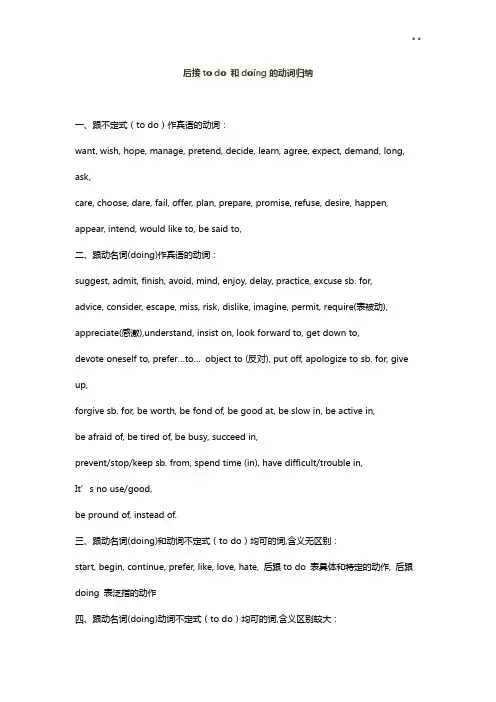
后接to do 和doing的动词归纳一、跟不定式(to do)作宾语的动词:want, wish, hope, manage, pretend, decide, learn, agree, expect, demand, long, ask,care, choose, dare, fail, offer, plan, prepare, promise, refuse, desire, happen, appear, intend, would like to, be said to,二、跟动名词(doing)作宾语的动词:suggest, admit, finish, avoid, mind, enjoy, delay, practice, excuse sb. for, advice, consider, escape, miss, risk, dislike, imagine, permit, require(表被动), appreciate(感激),understand, insist on, look forward to, get down to,devote oneself to, prefer…to…object to (反对), put off, apologize to sb. for, give up,forgive sb. for, be worth, be fond of, be good at, be slow in, be active in,be afraid of, be tired of, be busy, succeed in,prevent/stop/keep sb. from, spend time (in), have difficult/trouble in,It’s no use/good,be pround of, instead of.三、跟动名词(doing)和动词不定式(to do)均可的词,含义无区别:start, begin, continue, prefer, like, love, hate, 后跟to do 表具体和特定的动作, 后跟doing 表泛指的动作四、跟动名词(doing)动词不定式(to do)均可的词,含义区别较大:1. stop to do2. mean to do3. try to do4. agree to dostop doing mean doing try doing agree to sb doing5. be afraid to do6. remember to do7. forget to do8. allow/permit/advise sb. to dobe afraid of doing remember doing forget doing allow/permit/advise doing9. regret to do10. want to do11. need to do12. go on to doregret doing want doing (表被动) need(表被动) go on doing13. can’t help to do14. forbid sb. to do=forbid sb’s doingcan’t help doing forbid doing15.感官动词+ doing/to do感官动词see, watch, observe, notice, look at, hear, listen to, smell, taste, feel + do 表示动作的完整性,真实性;+doing 表示动作的连续性,进行性I saw him work in the garden yesterday.昨天我看见他在花园里干活了.(强调"我看见了"这个事实)I saw him working in the garden yesterday.(强调"我见他正干活"这个动作)昨天我见他正在花园里干活.典型例题1)They knew her very well. They had seen her ___ up from childhood.A. growB. grewC. was growingD. to grow答案:A.因题意为,他们看着她长大,因此强调的是成长的过程,而非正在长的动作,因此用see sb do sth 的句型.2)The missing boy was last seen ___ near the river.A. playingB. to be playingC. playD. to play答案A. 本题强调其动作,正在河边玩,应此用see sb. doing sth句型中学英语中哪些动词后加to do sth和加doing sth一、接不定式(而不接动名词)作宾语的24个常用动词afford to do sth. 负担得起做某事agree to do sth. 同意做某事arrange to do sth.安排做某事ask to do sth. 要求做某事beg to do sth. 请求做某事choose to do sth. 决定做某事decide to do sth. 决定做某事demand to do sth. 要求做某事determine to do sth. 决心做某事expect to do sth. 期待做某事fear to do sth. 害怕做某事help to do sth. 帮助做某事hope to do sth. 希望做某事learn to do sth. 学习做某事manage to do sth. 设法做某事offer to do sth. 主动提出做某事plan to do sth. 计划做某事prepare to do sth. 准备做某事pretend to do sth. 假装做某事promise to do sth. 答应做某事refuse to do sth. 拒绝做某事want to do sth. 想要做某事wish to do sth. 希望做某事注:有些不及物动词后习惯上也接不定式,不接动名词:aim to do sth. 打算做某事fail to do sth. 未能做某事happen to do sth. 碰巧做某事hesitate to do sth. 犹豫做某事struggle to do sth. 努力做某事二、接不定式作宾补的36个常用动词advise sb. to do sth. 建议某人做某事allow sb. to do sth. 允许某人做某事ask sb. to do sth.请(叫)某人做某事bear sb. to do sth.忍受某人做某事beg sb. to do sth. 请求某人做某事cause sb. to do sth. 导致某人做某事command sb. to do sth. 命令某人做某事drive sb. to do sth .驱使某人做某事elect sb. to do sth. 选举某人做某事encourage sb. to do sth. 鼓励某人做某事expect sb. to do sth. 期望某人做某事forbid sb. to do sth. 禁止某人做某事force sb. to do sth. 强迫某人做某事get sb. to do sth. 使(要)某人做某事hate sb. to do sth. 讨厌某人做某事help sb. to do sth. 帮助某人做某事intend sb. to do sth. 打算要某人做某事invite sb. to do sth. 邀请某人做某事leave sb. to do sth. 留下某人做某事like sb. to do sth. 喜欢某人做某事mean sb. to do sth. 打算要某人做某事need sb. to do sth. 需要某人做某事oblige sb. to do sth. 迫使某人做某事order sb. to do sth. 命令某人做某事permit sb. to do sth. 允许某人做某事persuade sb. to do sth. 说服某人做某事prefer sb. to do sth. 宁愿某人做某事request sb. to do sth. 要求某人做某事remind sb. to do sth. 提醒某人做某事teach sb. to do sth .教某人做某事tell sb. to do sth. 告诉某人做某事train sb. to do sth. 训练某人做某事trouble sb. to do sth. 麻烦某人做某事want sb. to do sth. 想要某人做某事warn sb. to do sth. 警告某人做某事wish sb. to do sth. 希望某人做某事注:不要受汉语意思的影响而误用以下动词句型:汉语说:“害怕某人做某事”,但英语不说fear sb. to do sth.。
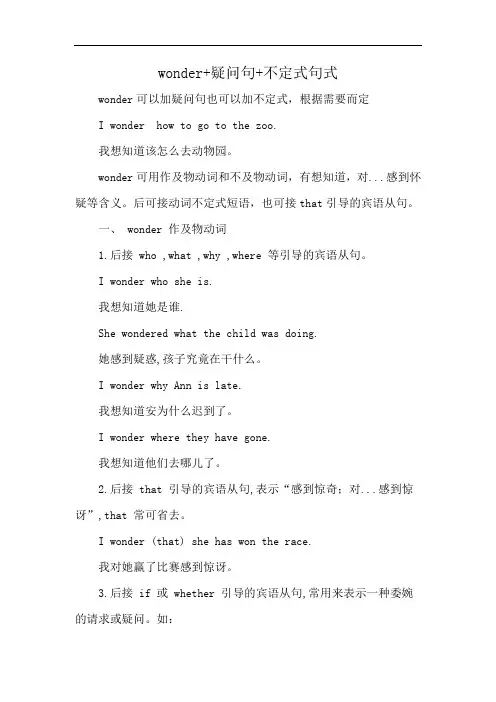
wonder+疑问句+不定式句式wonder可以加疑问句也可以加不定式,根据需要而定I wonder how to go to the zoo.我想知道该怎么去动物园。
wonder可用作及物动词和不及物动词,有想知道,对...感到怀疑等含义。
后可接动词不定式短语,也可接that引导的宾语从句。
一、 wonder 作及物动词1.后接 who ,what ,why ,where 等引导的宾语从句。
I wonder who she is.我想知道她是谁.She wondered what the child was doing.她感到疑惑,孩子究竟在干什么。
I wonder why Ann is late.我想知道安为什么迟到了。
I wonder where they have gone.我想知道他们去哪儿了。
2.后接 that 引导的宾语从句,表示“感到惊奇;对...感到惊讶”,that 常可省去。
I wonder (that) she has won the race.我对她赢了比赛感到惊讶。
3.后接 if 或 whether 引导的宾语从句,常用来表示一种委婉的请求或疑问。
如:She wondered whether you were free that morning. 她想知道你那天上午是否有空。
I wonder if he will succeed.我不知道他会不会成功。
4.后接动词不定式短语.如:I wondered to see you there.看到你在那里,我感到惊讶。
5.后接“疑问词+不定式”构成的短语.如:I'm just wondering how to do it.我正想知道该怎样做那件事。
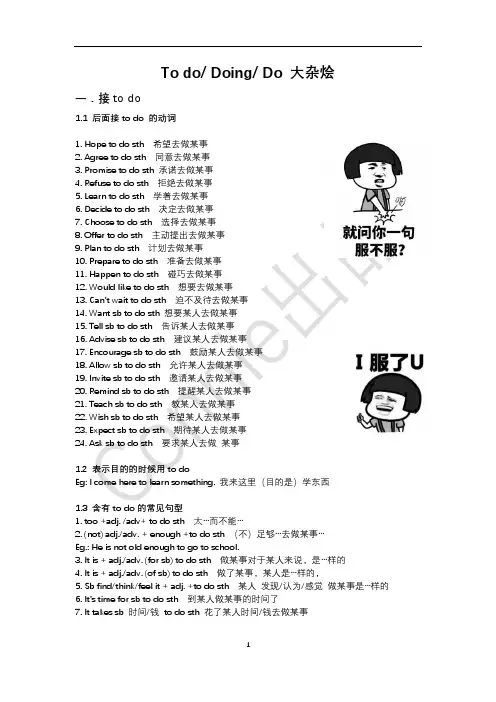
To do/ Doing/ Do 大杂烩一.接to do1.1 后面接to do 的动词1. Hope to do sth 希望去做某事2. Agree to do sth 同意去做某事3. Promise to do sth 承诺去做某事4. Refuse to do sth 拒绝去做某事5. Learn to do sth 学着去做某事6. Decide to do sth 决定去做某事7. Choose to do sth 选择去做某事8. Offer to do sth 主动提出去做某事9. Plan to do sth 计划去做某事10. Prepare to do sth 准备去做某事11. Happen to do sth 碰巧去做某事12. Would like to do sth 想要去做某事13. Can’t wait to do sth迫不及待去做某事14. Want sb to do sth 想要某人去做某事15. Tell sb to do sth 告诉某人去做某事16. Advise sb to do sth 建议某人去做某事17. Encourage sb to do sth 鼓励某人去做某事18. Allow sb to do sth 允许某人去做某事19. Invite sb to do sth 邀请某人去做某事20. Remind sb to do sth 提醒某人去做某事21. Teach sb to do sth 教某人去做某事22. Wish sb to do sth 希望某人去做某事23. Expect sb to do sth 期待某人去做某事24. Ask sb to do sth 要求某人去做某事1.2 表示目的的时候用to doEg: I come here to learn something. 我来这里(目的是)学东西1.3 含有to do的常见句型1. too +adj. /adv+ to do sth 太…而不能…2. (not) adj./adv. + enough +to do sth (不)足够…去做某事…Eg.: He is not old enough to go to school.3. It is + adj./adv. (for sb) to do sth 做某事对于某人来说,是…样的4. It is + adj./adv. (of sb) to do sth 做了某事,某人是…样的,5. Sb find/think/feel it + adj. +to do sth 某人发现/认为/感觉做某事是…样的6. It’s time for sb to do sth 到某人做某事的时间了7. It takes sb 时间/钱to do sth 花了某人时间/钱去做某事11.4 动词不定式to do 一般作后置定语,放在名词或代词之后。
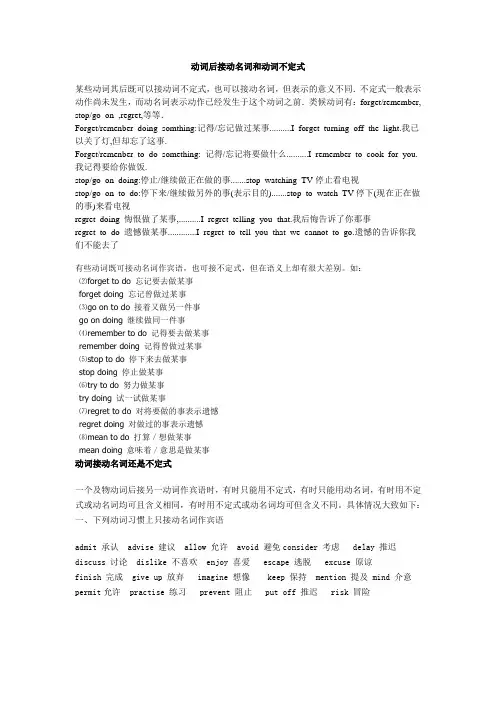
动词后接动名词和动词不定式某些动词其后既可以接动词不定式,也可以接动名词,但表示的意义不同.不定式一般表示动作尚未发生,而动名词表示动作已经发生于这个动词之前.类候动词有:forget/remember, stop/go on ,regret,等等.Forget/remenber doing somthing:记得/忘记做过某事..........I forget turning off the light.我已以关了灯,但却忘了这事.Forget/remenber to do something: 记得/忘记将要做什么..........I remember to cook for you.我记得要给你做饭.stop/go on doing:停止/继续做正在做的事.......stop watching TV停止看电视stop/go on to do:停下来/继续做另外的事(表示目的).......stop to watch TV停下(现在正在做的事)来看电视regret doing 悔恨做了某事,..........I regret telling you that.我后悔告诉了你那事regret to do 遗憾做某事.............I regret to tell you that we cannot to go.遗憾的告诉你我们不能去了有些动词既可接动名词作宾语,也可接不定式,但在语义上却有很大差别。
如:⑵forget to do 忘记要去做某事forget doing 忘记曾做过某事⑶go on to do 接着又做另一件事go on doing 继续做同一件事⑷remember to do 记得要去做某事remember doing 记得曾做过某事⑸stop to do 停下来去做某事stop doing 停止做某事⑹try to do 努力做某事try doing 试一试做某事⑺regret to do 对将要做的事表示遗憾regret doing 对做过的事表示遗憾⑻mean to do 打算/想做某事mean doing 意味着/意思是做某事动词接动名词还是不定式一个及物动词后接另一动词作宾语时,有时只能用不定式,有时只能用动名词,有时用不定式或动名词均可且含义相同,有时用不定式或动名词均可但含义不同。
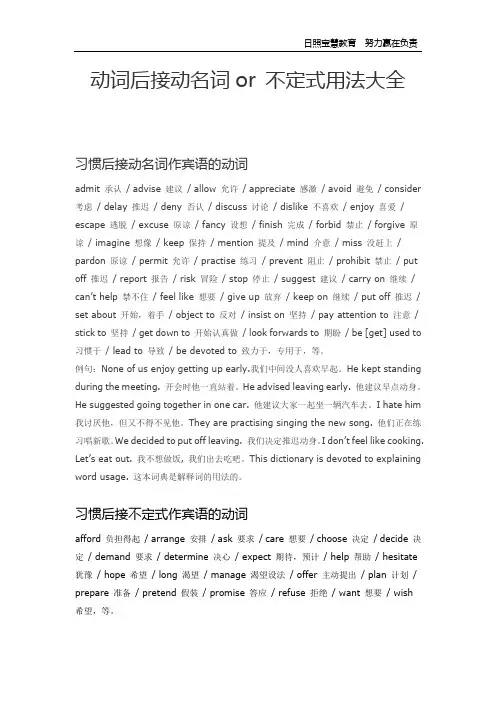
动词后接动名词or 不定式用法大全习惯后接动名词作宾语的动词admit 承认/ advise 建议/ allow 允许/ appreciate 感激/ avoid 避免/ consider 考虑/ delay 推迟/ deny 否认/ discuss 讨论/ dislike 不喜欢/ enjoy 喜爱/ escape 逃脱/ excuse 原谅/ fancy 设想/ finish 完成/ forbid 禁止/ forgive 原谅/ imagine 想像/ keep 保持/ mention 提及/ mind 介意/ miss 没赶上/ pardon 原谅/ permit 允许/ practise 练习/ prevent 阻止/ prohibit 禁止/ put off 推迟/ report 报告/ risk 冒险/ stop 停止/ suggest 建议/ carry on 继续/ can’t help 禁不住/ feel like 想要/ give up 放弃/ keep on 继续/ put off 推迟/ set about 开始,着手/ object to 反对/ insist on 坚持/ pay attention to 注意/ stick to 坚持/ get down to 开始认真做/ look forwards to 期盼/ be [get] used to 习惯于/ lead to 导致/ be devoted to 致力于,专用于,等。
例句:None of us enjoy getting up early.我们中间没人喜欢早起。
He kept standing during the meeting. 开会时他一直站着。
He advised leaving early. 他建议早点动身。
He suggested going together in one car. 他建议大家一起坐一辆汽车去。
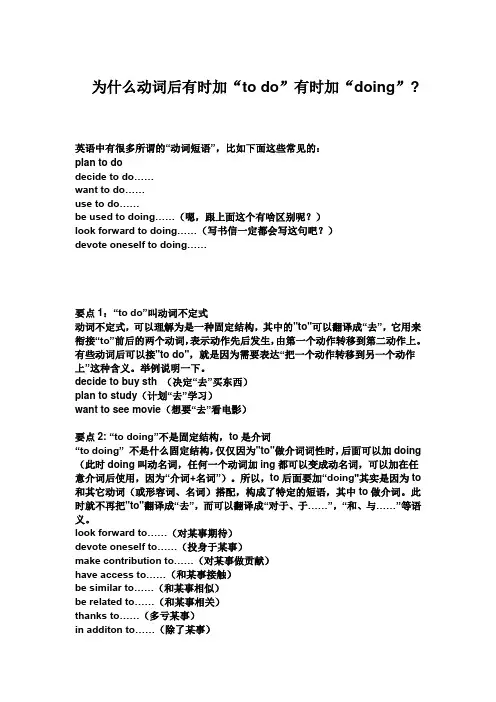
为什么动词后有时加“to do”有时加“doing”?英语中有很多所谓的“动词短语”,比如下面这些常见的:plan to dodecide to do……want to do……use to do……be used to doing……(嗯,跟上面这个有啥区别呢?)look forward to doing……(写书信一定都会写这句吧?)devote oneself to doing……要点1:“to do”叫动词不定式动词不定式,可以理解为是一种固定结构,其中的"to"可以翻译成“去”,它用来衔接“to”前后的两个动词,表示动作先后发生,由第一个动作转移到第二动作上。
有些动词后可以接"to do",就是因为需要表达“把一个动作转移到另一个动作上”这种含义。
举例说明一下。
decide to buy sth (决定“去”买东西)plan to study(计划“去”学习)want to see movie(想要“去”看电影)要点2: “to doing”不是固定结构,to是介词“to doing” 不是什么固定结构,仅仅因为"to"做介词词性时,后面可以加doing (此时doing叫动名词,任何一个动词加ing都可以变成动名词,可以加在任意介词后使用,因为“介词+名词”)。
所以,to后面要加“doing"其实是因为to 和其它动词(或形容词、名词)搭配,构成了特定的短语,其中to做介词。
此时就不再把"to"翻译成“去”,而可以翻译成“对于、于……”,“和、与……”等语义。
look forward to……(对某事期待)devote oneself to……(投身于某事)make contribution to……(对某事做贡献)have access to……(和某事接触)be similar to……(和某事相似)be related to……(和某事相关)thanks to……(多亏某事)in additon to……(除了某事)以上动词短语、名词短语、形容词短语中的to”全部都是介词,这些短语后面都要加名词(注意,我特地翻译成“某事”,就是想强调后面加名词),所以一旦碰到动词,后面就只能接“doing ”,把动词变名词,才不会出现语法错误。
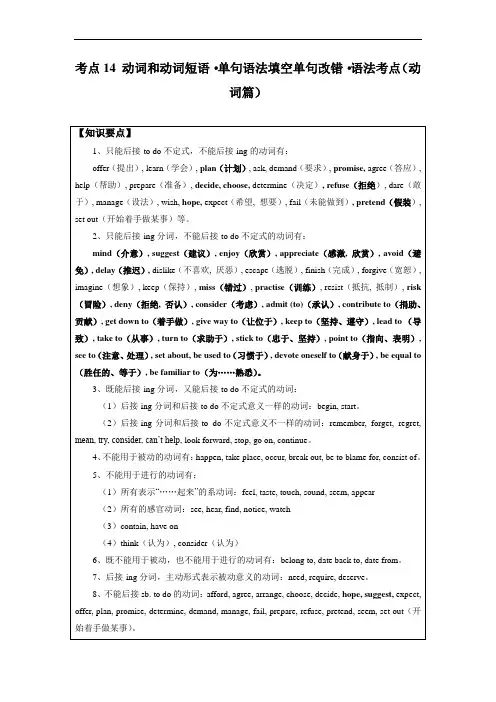
考点14 动词和动词短语·单句语法填空单句改错·语法考点(动词篇)【考题14】单句语法填空。
1. The pen writes ______ (smooth).2. All the passengers must remain ______ (seat) until the bus has stopped completely.3. Remember ______ (turn) off the lights before you leave.4. Do you remember ______ (see) me before?5. We have been reading books for ten minutes. Let’s stop ______ (have) a rest.6. Having finished the exercises, we went on ______ (learn) the new words in the unit.7. After a short rest,they went on ______ (work).8. He stopped ______ (talk) when the bell rang.9. While working, he stopped ______ (talk) to with Tom at times.10. I try not ______ (think) about that.11. Would you please try ______ (do) that again?12. I mean ______ (change) it for another one.13. Missing the train means ______ (wait) for another hour.14. Please permit me ______ (say) a few words.15. We don’t permit ______ (smoke) here.16. These group of people are those who aren’t allowed ______ (enter) the room17. The room needs ______ (clean).18. The book deserves ______ (read).19. I prefer ______ (walk) to school every day.20. I prefer ______ (stay) at home today.21. We began ______ (do) that job last year.22. When the teacher came into the room,he was starting ______ (write) to his parents.23. Hearing the news,he started ______ (think) of a good way to solve the problem.24. We were about to leave when it began ______ (rain).25. I am so busy these days,so I can’t help ______ (decorate) your house.26. I can’t help ______ (laugh) when I see his funny clothes.27. Look forward ______ (avoid) running into any car.28. I am looking forward to ______ (receive) your letter.KEYS:1. smoothly2. seated3. to turn4. seeing5. to have6. to learn7. working8. talking9. to talk 10. to think 11. doing 12. to change 13. waiting 14. to say 15. smoking 16. to enter17. cleaning/ to be cleaned 18. reading/ to be read 19. walking 20. to stay21. doing/ to do 22. to write 23. to think 24. to rain25. (to) decorate 26. laughing 27. to avoid 28. receiving考点15 动词的时态和语态·单句语法填空单句改错·语法考点(动词篇)【考题15】单句语法填空。
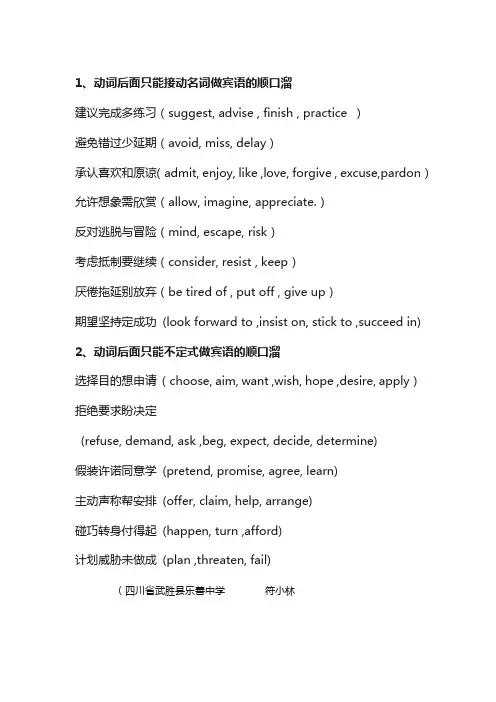
1、动词后面只能接动名词做宾语的顺口溜
建议完成多练习(suggest, advise , finish , practice )
避免错过少延期(avoid, miss, delay)
承认喜欢和原谅(admit, enjoy, like ,love, forgive , excuse,pardon)允许想象需欣赏(allow, imagine, appreciate.)
反对逃脱与冒险(mind, escape, risk)
考虑抵制要继续(consider, resist , keep)
厌倦拖延别放弃(be tired of , put off , give up)
期望坚持定成功(look forward to ,insist on, stick to ,succeed in) 2、动词后面只能不定式做宾语的顺口溜
选择目的想申请(choose, aim, want ,wish, hope ,desire, apply)拒绝要求盼决定
(refuse, demand, ask ,beg, expect, decide, determine)
假装许诺同意学(pretend, promise, agree, learn)
主动声称帮安排(offer, claim, help, arrange)
碰巧转身付得起(happen, turn ,afford)
计划威胁未做成(plan ,threaten, fail)
(四川省武胜县乐善中学符小林。
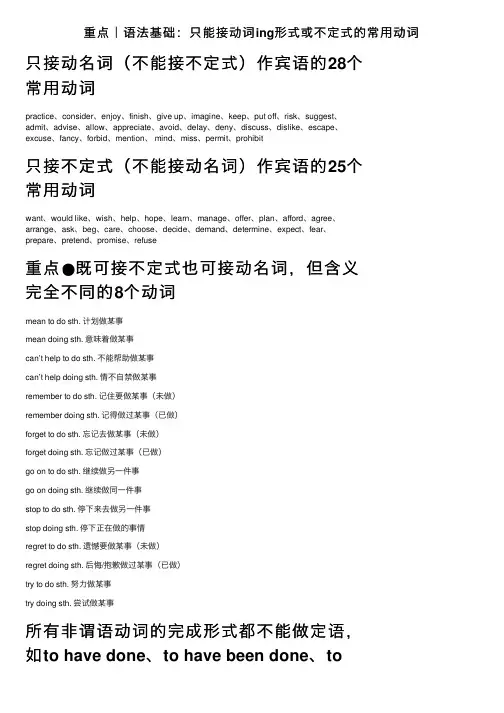
重点|语法基础:只能接动词ing形式或不定式的常⽤动词只接动名词(不能接不定式)作宾语的28个常⽤动词practice、consider、enjoy、finish、give up、imagine、keep、put off、risk、suggest、admit、advise、allow、appreciate、avoid、delay、deny、discuss、dislike、escape、excuse、fancy、forbid、mention、 mind、miss、permit、prohibit只接不定式(不能接动名词)作宾语的25个常⽤动词want、would like、wish、help、hope、learn、manage、offer、plan、afford、agree、arrange、ask、beg、care、choose、decide、demand、determine、expect、fear、prepare、pretend、promise、refuse重点●既可接不定式也可接动名词,但含义完全不同的8个动词mean to do sth. 计划做某事mean doing sth. 意味着做某事can’t help to do sth. 不能帮助做某事can’t help doing sth. 情不⾃禁做某事remember to do sth. 记住要做某事(未做)remember doing sth. 记得做过某事(已做)forget to do sth. 忘记去做某事(未做)forget doing sth. 忘记做过某事(已做)go on to do sth. 继续做另⼀件事go on doing sth. 继续做同⼀件事stop to do sth. 停下来去做另⼀件事stop doing sth. 停下正在做的事情regret to do sth. 遗憾要做某事(未做)regret doing sth. 后悔/抱歉做过某事(已做)try to do sth. 努⼒做某事try doing sth. 尝试做某事所有⾮谓语动词的完成形式都不能做定语,如to have done、to have been done、tohave been doing、having done 和 having been done。
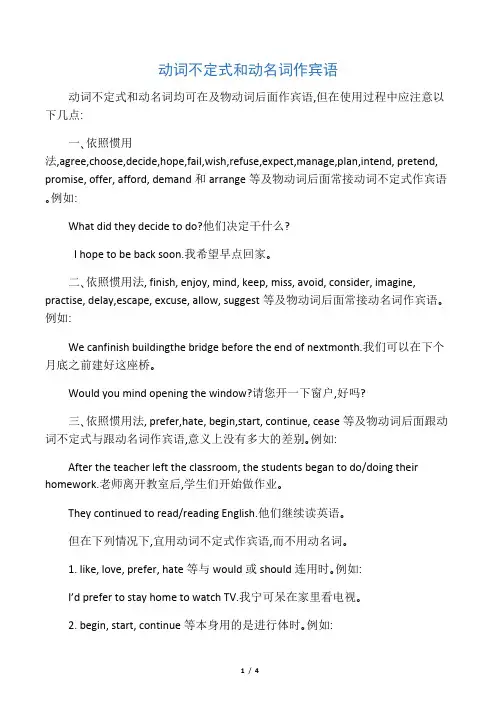
动词不定式和动名词作宾语动词不定式和动名词均可在及物动词后面作宾语,但在使用过程中应注意以下几点:一、依照惯用法,agree,choose,decide,hope,fail,wish,refuse,expect,manage,plan,intend, pretend, promise, offer, afford, demand和arrange等及物动词后面常接动词不定式作宾语。例如:What did they decide to do?他们决定干什么?I hope to be back soon.我希望早点回家。二、依照惯用法, finish, enjoy, mind, keep, miss, avoid, consider, imagine, practise, delay,escape, excuse, allow, suggest等及物动词后面常接动名词作宾语。例如:We canfinish buildingthe bridge before the end of nextmonth.我们可以在下个月底之前建好这座桥。Would you mind opening the window?请您开一下窗户,好吗?三、依照惯用法, prefer,hate, begin,start, continue, cease等及物动词后面跟动词不定式与跟动名词作宾语,意义上没有多大的差别。例如:After the teacher left the classroom, the students began to do/doing their homework.老师离开教室后,学生们开始做作业。They continued to read/reading English.他们继续读英语。但在下列情况下,宜用动词不定式作宾语,而不用动名词。1. like, love, prefer, hate等与would或should连用时。例如:I’d prefer to stay home to watch TV.我宁可呆在家里看电视。2. begin, start, continue等本身用的是进行体时。例如:She was starting to do her homework.她开始做作业。3. begin, start, cease, continue的主语是物而不是人时。例如:It began/started to rain.天开始下雨。The ice ceased to melt(融化) in winter.冬季冰不再融化。4. begin等及物动词后接know, understand, realize等表示心理状态的动词。例如:They began to realize theimportance oflearning aforeignlanguage well.他们开始意识到学好一门外语的重要性。四、下列动词后面既可接动词不定式作宾语,也可接动名词作宾语,但两种结构的意义有区别:1. rember,forget, regret等后接动词不定式作宾语时,说明动词不定式表示的动作发生在后, rember等动词表示的动作发生在前;这些动词后接动名词作宾语时,说明动名词表示的动作发生在前, rember等动词表示的动作发生在后。试比较:Shetoldme togo andlock the door. She didn’t remberlocking the door after supper.她叫我去锁门,她不记得晚饭后锁过门了。Rember to turn off all the lights when you leave the classroom.你离开教室时,别忘记把所有的灯关掉。2. try, mean, can’t help,go on等动词后接动词不定式和动名词时,意义有明显的差别:1) try后面的动词不定式是作目的状语,tryto do sth意为“尽力做某事”; try 后面的动名词是作宾语, try doing sth意为“尝试做某事”。例如:He tried not to be late for the meeting.他争取开会不迟到。The soup is a little salty. Try adding some water to it.汤咸了点,加点水试试看。2)mean后面的动词不定式和动名词都是作宾语。meantodosth意为“打算(意图)做某事”; mean doing sth意为“意味着做某事”。例如:They didn’t mean to go an d help you.他们不打算去帮助你们。Hiswordsmeantgoingtohelpyouwithoutdelay.他的话意味着他将毫不迟疑地前去帮助你们。3) help后面的动词不定式和动名词都是作宾语。can’t help to do sth意为“不能帮忙做某事”; can’t help doing sth意为“禁不住去做某事,情不自禁地做某事”。例如:I’m sorry I can’t help to clean the room.对不起,我不能帮助打扫房间。They couldn’t helplaughingwhen theyheard the joke.听到这个笑话,他们不禁大笑起来。4) go on后面的动词不定式是作目的状语。go on to do sth意为“接下去做另一件事”;go on后面的动名词是作宾语。go on doing sth意为“继续做同一件事”。例如:They went on to do some exercises after reading the text.读完课文后,他们接着做练习。We went on doing our homework after he left.他走后我们继续做作业。五、need, want, require等动词后面跟动名词的主动形式和跟动词不定式的被动式,都表示被动意义。试比较:Your house needs repairing/to be repaired.你的房子需要维修。The problem requires solving/to be solved immediately.这个问题需要立即予以解决。六、stop之后的动名词为宾语, stop之后的动词不定式为目的状语。试比较:We stopped working.我们停止工作。We stopped to have a rest.我们停下来休息一下。When it began to rain, we stopped working to have a rest.天开始下雨,我们停止工作,休息一下。在英语中,某些动词后面只能跟动词不定式作直接宾语。
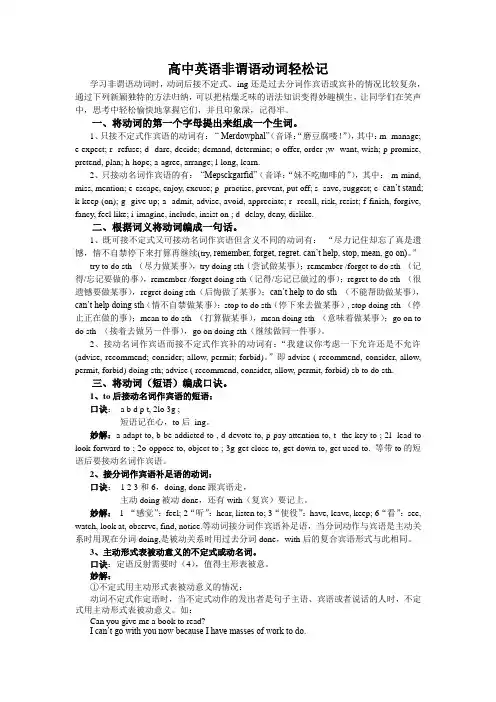
高中英语非谓语动词轻松记学习非谓语动词时,动词后接不定式、-ing还是过去分词作宾语或宾补的情况比较复杂,通过下列新颖独特的方法归纳,可以把枯燥乏味的语法知识变得妙趣横生,让同学们在笑声中,思考中轻松愉快地掌握它们,并且印象深,记得牢。
一、将动词的第一个字母提出来组成一个生词。
1、只接不定式作宾语的动词有:“ Merdowphal”(音译:“磨豆腐喽!”),其中:m- manage; e-expect; r- refuse; d- dare, decide; demand, determine; o-offer, order ;w- want, wish; p-promise, pretend, plan; h-hope; a-agree, arrange; l-long, learn.2、只接动名词作宾语的有:“Mepsckgarfid”(音译:“妹不吃咖啡的”),其中:m-mind, miss, mention; e-escape, enjoy, excuse; p- practise, prevent, put off; s- save, suggest; c- can’t stand; k-keep (on); g- give up; a- admit, advise, avoid, appreciate; r- recall, risk, resist; f-finish, forgive, fancy, feel like; i-imagine, include, insist on ; d- delay, deny, dislike.二、根据词义将动词编成一句话。
1、既可接不定式又可接动名词作宾语但含义不同的动词有:“尽力记住却忘了真是遗憾,情不自禁停下来打算再继续(try, remember, forget, regret, can’t help, stop, mean, go on)。
高中英语名师解惑:动词后面,到底是接不定式还是动名词?在学习了不定式和动名词以后,经常有学生问道:“这个动词后面,是接不定式还是动名词??”一般地讲,动词后面接不定式,表示一件具体的事情,或者是还没有做的事情;动词后面接动名词,表示泛指的事情,或者是正在进行的事情。
如果你还在为动词后面到底接不定式还是动名词而发愁?今天这篇内容可一定要认真看了哦!那么,就让我们一起来学习吧!只接不定式(不能接动名词)作宾语的25个常用动词1. want to do sth. 想要做某事I want to buy a new computer this a ernoon.我想今天下午买台新电脑。
2. would like to do sth.想要做某事I would like to invite you to come to my birthday party this Saturday. 我想邀请你这周六来我的聚会。
3. wish to do sth. 希望做某事I wish to live on the moon one day.我希望有一天在月球上生活。
4. help to do sth. 帮助做某事I o en help to do some chores at home.我在家经常帮着做家务。
5. hope to do sth. 希望做某事I hope to have a good rest this weekend.我希望这周末好好休息一下。
6. learn to do sth. 学会做某事He finally learned to play the piano with the help of the teacher. 在老师的帮助下,他最终学会了弹钢琴。
在老师的帮助下,他最终学会了弹钢琴。
7. manage to do sth. 设法做成某事设法做成某事They managed to escape the fire yesterday.昨天他们设法逃脱了火灾。
初二英语动词不定式口诀
不定式和动词-ing 形式都可以作宾语,现总结一些技巧和口诀:1.通常只能接动词-ing 形式作宾语的动词(或动词短语):
建议抵制享受——(suggest, advise; resist; enjoy)
考虑承认冒险——(consider; admit; risk)
避免推迟实践——(avoid; delay; practise)
期待成功完成——(look forward to; succeed in; finish) 2.通常只能接不定式作宾语的动词:
agree (同意); offer (提出); intend, plan (打算,计划); demand,ask (要求); promise (答应); help (帮忙); prepare (准备);decide (决定); refuse (拒绝);dare (敢于); choose (选择);wish,hope,want, expect (希望,想要); fail ;(不能;忘记);pretend (假装); manage (设法); determine (决心)。
同意提出做计划,要求答应来帮忙。
准备决定遭拒绝,敢于选择有希望。
不能做到莫假装,设法做成决心强。
3.既能接不定式,又能接动词-ing 形式,但意思不同的动词或词组:即“四'记’”“力争”“不后悔”。
四“记”指“记得、记住(remember)”;“忘记(forget)”“计划、打算(mean)”;“继续(go on)”;力争指“try”;“不”“后悔”指stop与regret。
一.动词后接不定式和动名词的区别1. Stop to do 停止,中断做某事后去做另一件事Stop doing 停止正在做的某事They stopped to smoke a cigarette.I must stop smoking.2. Forget to do 忘记要去做Forget doing 忘记做过某事The light in the office is still on. He forgot to turn it off.He forgot turning the light off.3. remember to do 记着去做某事Remember doing 记着做过某事Remember to go to the post office after school.Don’t you remember seeing the man before?4. try to do 设法或努力去做某事Try doing 尝试着做某事You must try to be more careful.I tried gardening but didn’t succeed.5. regret to do 对要做的事情遗憾Regret doing 对做过的事情遗憾,后悔I regret to have to do this, but I have no choice.I don’t regret telling her what I thought.6. mean to do 打算,想Mean doing 意味着I mean to go, but my father would not allow me to.Doing that means wasting time.7. go on to do 放下手中的活,继续去做别的活Go on doing 继续做原来做的活We had supper and went on to watch TV.He didn’t have a rest and went on working.8. be afraid to do 不敢,胆怯去做某事,主观原因不去做意为“怕”Be afraid doing 担心出现doing 所指的状况,结果,doing 是客观造成的结果,意为“生怕”“恐怕”She was afraid to wake her husband up.She was afraid of waking her husband.二.动词不定式做宾补和分词做宾补的区别Look at, see, watch, hear, find, feel 等感官动词后接不定式做宾补时,表示动作的全过程已结束,后接分词做宾补时,表示动作的一部分正在进行。
wanttodosth翻译want to do sth意思是想要做某事。
其中,want 想要,后面接动词不定式形式to do。
动词不定式是动词的一种非限定形式,由to加动词原形构成,在句中起名词、形容词和副词的作用,同时也保留动词的一些特征,可以带宾语、状语和宾语补足语等。
want to后面的动词用动词原形形式,want to do sth是固定短语,表示想要做某事。
动词短语,可以作谓语。
如:I want to do my homework.我打算做作业。
扩展资料:只接不定式,不能接动名词作宾语的常用动词有want(想要)、would like (想要)、hope(希望)、wish(希望)、help(帮助)、plan(计划)等。
1、want to do sth. 想要做某事 ,want后接不定式,可作谓语。
如:I want to buy a new computer this afternoon. 我想今天下午买台新电脑。
2、would like to do sth.想要做某事,would like后接不定式,可作谓语。
如: I would like to invite you to come to my birthday party this Saturday. 我想邀请你这周六来我的聚会。
3、wish to do sth. 希望做某事,wish后接不定式,可作谓语。
如:I wish to live on the moon one day. 我希望有一天在月球上生活。
4、help to do sth. 帮助做某事,help后接不定式,可作谓语。
如:I often help to do some chores at home. 我在家经常帮着做家务。
5、hope to do sth. 希望做某事,hope后接不定式,可作谓语。
如:I hope to have a good rest this weekend. 我希望这周末好好休息一下。
接不定式作宾语的动词顺口溜【2 】一接不定式作宾语的动词顺口溜动词不定作宾语,期希渴欲承担起;欲望恰巧又消失,伪装安排不谢绝;预备筹划却掉败,似乎供给又迟疑;妄图要把目的证,爱恨请求作选择.动词+ 不定式aim appear agree arrange ask be decide bother care choose come dare demand desire determine expect electendeavor hope fail happen help hesitate learn long mean manage offer ought plan prepare pretend promise refuse seem tendwait wish undertake后直接加to do sth作宾语二接不定式作宾语的动词【速记口诀】三个欲望两答应,两个请求莫谢绝;设法学会做决议,不要伪装在选择.【趣话诠释】三个欲望两答应:hope,wish,want,agree,promise两个请求莫谢绝:demand,ask,refuse设法学会做决议:manage,learn,decide不要伪装在选择:petend,choose三接动名词作宾语的动词【速记口诀】Mrs.PBlackmissedabeefbag.(P·布莱克夫人丢了一个牛肉袋.)【趣话诠释】该句话中每个字母代表了一个动词或短语,这些动词请求后面跟动名词作宾语.这些动词分离是:M=mind,r=risk,s=succeedin,P=practice,B=bebusy,l=lookforwardto,a=admit,c=can'thelp,k=keepon ,m=miss,i=insiston,s=suggest,s=stop,e=enjoy,d=delay,a=avoid,b=beworth,a=advise,g=giveup.四不定式作宾语补足语时省to的动词【速记口诀】一感,二听,三让,四看,半关心趣话诠释】一感:feel;二听:hear,listento;三让:make,let,have;四看:see,notice,watch,ob-serve;半关心:help.五.形容词和副词比较等级用法【速记口诀】1.比较级与最高等:两者比较than相连,三者比较the在前.2.同级比较:同级比较用本相,as…as永不离;as…as加not,只言两者是统一,若是notso…as,后强前弱不看齐.【趣话诠释】①比较级平日和than连用,而最高等平日跟有定冠词the;②同级比较一般用as…as表示"与…一样",这时谁强谁弱不能比较出来,而notso…as 则表示后者比前者强,翻译为"不如……".六.反意疑问句用法【速记口诀】反意问句三要点,前后谓语正相反;短句not如消失,必须缩写是习惯;最后一点应留意,短句主语代词填.【趣话诠释】①反意疑问句的构成应当是"确定的陈述句+否认的疑问"或"否认的陈述句+确定的疑问";②在短句中not必须与do,will,can等构成缩写情势;③在简短问句中,疑问句的主语必须是代词,而不能用名词情势.七.感慨句用法【速记口诀】感慨句,并不难,what.how放句前;强调名词用what,其余用how很简略.【趣话诠释】由what引诱的感慨句一般润饰名词,而how引诱的感慨句一般润饰形容词.副词或句子.。
后接不定式(to do)的动词总汇(不定式做宾语、宾补)Aafford to do sth.负担得起做某事1.We cant’t afford to pay such a price. (金钱上)2.You can’t afford to lose her. (精神上)agree to do sth.同意做某事1.At last she agree to marry him.2.I agree to hiking with him.arrange to do sth.安排做某事1.I have arranged to see him on Friday morning.2.What do you arrange to do tomorrow?ask to do sth.要求做某事1.I ask to see your boss.2.I ask to quit.aim to do sth.打算做某事1.I aim to finish it tomorrow.2.I aim to learn driving next year.advise sb.to do sth.建议某人做某事1.The doctor advised me to drink more water.2.I advise you to join a training course.allow sb.to do sth.允许某人做某事1.His parents won’t allow her to stay out late.2.My father doesn’t allow me to smoke.ask sb.to do sth.请(叫)某人做某事1.I ask you to apologize to me for your rudeness.2.I have to ask Mary to wait at the stop.Bbeg to do sth.恳请(求)做某事1.I beg to see her.2.I beg to do this.beg sb.to do sth.恳请(求)某人做某事1.I beg you to forgive her.2.I beg you to let me see the mayor.bear sb.to do sth.忍受某人做某事(该句型多用于否定) [beə(r)]1.I can’t bear her to do this.2.I can’t bear you to say so again.Ccare to do sth.想要做某事1.Would you care to read this article.2.I will care to help her without pay.choose to do sth.决定做某事1.She didn’t choose to marry my brother.2.Chairman chooses to attend this meeting.cause sb.to do sth.导致某人做某事1.The bad news caused her to cry.2.The accident ten years ago caused him to be disabled.命令某人做某事1.He command the boy to close the door.2.The boss commands us to work overtime tonight. Ddecide to do sth.决定做某事1.I have decided to learn driving next year.2.She didn’t decide to forgive you.demand to do sth.(强烈)要求做某事1.The people demanded to know the truth.2.The manager demanded to take part in the training. determine to do sth.决定做某事1.She has determined to buy a car.2.They determined to set out right away.drive sb.to do sth .驱使(逼迫)某人做某事1.Hunger drove him to steal.2.His rudeness drove me to quarrel with him.Eexpect to do sth.期望做某事1.I expect to pass the exam.2.But how do you expect to do this?elect to do sth.决定做某事1.I elect to stay.2.He elected to become an engineer.鼓励某人做某事1.He was encourage to take part in the activity.2.We should encourage the students to read more books. expect sb.to do sth.期望某人做某事1.I’m expecting you to telephone me soon.2.The teacher expects us to work hard.Ffear to do sth.害怕做某事1.She fears to speak in pubilc.2.For the cause of revolution,he did not fear to die.fail to do sth.未能做某事1.I failed to see him.He was out.2.She never fails to keep her words.forbid sb.to do sth.禁止某人做某事1.Her mother forbids her to stay out after midnight.2.The King forbade him to leave England.force sb.to do sth.强迫某人做某事1.He force me to give him the money.2.The soldiers forced the enemy to fall back.Gget sb.to do sth.使(要)某人做某事1.Mother got me to prepare our lunch.2.I can’t get this old car to start.Hhelp to do sth.帮助做某事1.This dictionary will help to improve your English.2.Would you help to cut down the tree?hope to do sth.希望做某事1.We all hope to go to college.2.I hope to hear from you soon.happen to do sth.碰巧/刚好做某事1.You happened to be out when I came to your house.2.She happened to have just finished reading the book. hesitate to do sth.犹豫/不情愿做某事1.I hesitate to go back to my parents.2.I hesitated to take such a big risk.hate sb.to do sth.讨厌某人做某事1.He hates us to call him Chairman Wang.2.I hated you to talk so loudly when I read books. help sb.to do sth.帮助某人做某事1.We must help him to correct his shortcomings.2.Will you help me to prepare for the party?intend to do sth.打算要做某事1.I hear they intend to marry.2.I intended to go to you house last night,but it rained. intend sb.to do sth.打算让某人做某事1.She intends me to have a talk with her parents.2.He intended his son to join the army.invite sb.to do sth.邀请某人做某事1.They invited us to take part in their party.2.He invited me to come and see him at Paris.Llearn to do sth.学习做某事1.He began to learn to read and write at the age of five.2.I’m learning to paint.long to do sth.渴望做某事1.We are longing to see you.2.I long to get this chance.leave sb.to do sth.留下某人做某事1.Leave him to do it himself.2.I’ll leave you to settle all the business.like sb.to do sth.喜欢某人做某事1.I like you to do it like this.2.Everyone likes others to talk with oneself friendly. Mmanage to do sth.设法做某事1.We managed to finish the work ahead of time.2.We managed to make up for the lose time.mean sb.to do sth.打算要某人做某事1.We didn’t mean you to go out alone.2.She meant us to help her.Nneed to do sth.需要做某事1.You don’t need to leave so early.2.I need to know how old are you.need sb.to do sth.需要某人做某事1.I need someone to look after her.2.We need you to work for us.Ooffer to do sth.(主动)提出做某事1.He offer to lend me the money.2.The driver offered to drive us to the station.oblige sb.to do sth.迫使某人做某事[ə'blaɪdʒ]1.The police obliged him to leave.2.This fog may oblige me to walk home.order sb.to do sth.命令某人做某事1.The teacher ordered us to hand in homework on time.2.The police ordered them to wait right there.Pplan to do sth.计划做某事1.What do you plan to do during the holidays?2.He is planning to visit England next month. prepare to do sth. [prɪ'peə(r)]准备做某事1.I am preparing to do the work.2.I prepare to go for a walk after dinner.pretend to do sth.假装做某事1.He pretended to be ill.2.We mustn’t pretend to know what we don’t know. prefer to do sth.宁愿做某事1.He preferred to die instead of stealing.2.I prefer to stay at home when it is raining, promise to do sth. ['prɒmɪs]答应做某事1.I promise to return your car in good condition.2.It promises to be fine tomorrow.permit sb.to do sth.允许某人做某事1.Will you permit me to smoke here?2.We didn’t permit him to do so.persuade sb.to do sth. [pə'sweɪd]说服某人做某事1.I shall persuade him to take the medicine.2.I persuade my sister to accept the job.prefer sb.to do sth.宁愿(希望)某人做某事1.I preferred her not to come.2.I prefer my parents to understand me.Rrefuse to do sth. [rɪ'fjuːz]拒绝做某事1.She refuses to tell us the truth.2.He never refuses to help others.remind sb.to do sth.提醒某人做某事1.He reminded himself to thank her for the present.2.He reminded me to lock up the house when I go out.request sb.to do sth. [rɪ'kwest]要求某人做某事1.Chairman formally requested the president of the US visit China.2.We requested the police to reveal the truth.Sstruggle to do sth. ['strʌɡl]努力做某事1.He struggled to control his temper.2.I am struggling to pass the final examination.Tteach sb.to do sth .教某人做某事1.He will teach his son to swim.2.That girl taught me to sing the song.tell sb.to do sth.告诉(让)某人做某事1.Tell him to wait for us at the gate.2.Mother told you to be home by ten.train sb.to do sth.[treɪn]训练某人做某事1.The teacher trains us to make use of reference book.2.You should train your dog not to bark.trouble sb.to do sth.麻烦某人做某事1.May I trouble you to pass me the book?2.I’ll trouble you to go there meeting me.Wwant to do sth.想要做某事1.I want to learn to paint.2.I want to tell the truth.wish to do sth.希望做某事1.I don’t wish to be disturbed in my work.2.I wish to express our warmest welcome to you.want sb.to do sth.想要某人做某事1.The manager wants me to think it over.2.He wants you to see him in his office tomorrow morning. warn sb.to do sth.[wɔːn]警告某人做某事1.I have warned him not to do that.2.They warned him to be careful.wish sb.to do sth.希望某人做某事1.I wish yo to leave me alone.2.I wish the country to be reunited at an early date.。
1
只能后接不定式的动词和短语$只能接-ing形式的动词和短语
一、只能后接不定式的动词和短语归纳有的动词后只能用不定式而不能接动名
词。
如ask, demand(要求), plan, intend, mean(计划), manage, do / try one’s
best, make an attempt, (努力), learn(学习), wish, hope, desire, expect,
long, want, would like, should like, would prefer(), wish,希望、愿意),
agree, promise(同意), decide, determine, choose, make a decision, make
up one’s mind(决定), offer(主动提出), apply(申请), help(帮助), fail(不
能、没有), prepare(准备), pretend(假装), refuse(拒绝), happen(碰巧),
afford(负担得起)等。
二、只能后接不定式的动词和短语考题
1. We agreed ________ here but so far she hasn’t turned up yet. (全国
卷)
A. having met B. meeting C. to meet D.
to have met
【分析】答案选C。agree只能接不定,在谓语动之后发生,用一般式。
2. She pretended ______me when I passed by. (全国卷)
A. not to see
B. not seeing
C. to not see
D. having not seen
【分析】答案选A。pretend只能接不定式,not要放在不定式的前面构成否定。
只能接-ing形式的35动词和短语
一、用法归纳有的动词或短语动词后只能用动名词而不能接不定式。如allow,
permit(允许), consider(考虑), suggest, advice(建议),oman'">), suggest,
advice(反复; 不停), finish(完成), imagine(想象), practise(练习),
understand(明白), appreciate, enjoy(喜欢), miss(错过; 怀念), prevent(阻
止), forbid(禁止), escape(避免), include(包括), forgive, pardon,
excuse(原谅), dislike(厌恶), discuss(讨论), report(报道), admit(承认),
mind(介意), risk(冒险), can’t stand(不能忍受), burst out(突然开始),
feel like(想要), insist on(坚持), delay, put off(推迟), give up(放弃),
be busy(忙于), be worth(值得)等。
二、考题分析1. Do you mind ________ alone at home? (上海卷)
A. Jane leaving B. Jane having left
C. Jane’s being left D. Jane to be left
【分析】答案选C。mind后只能接-ing形式,且Jane与leave是被动关系。
2. The squirrel was so lucky that it just missed ________. (全国卷)
A. catching B. to be
caught
2
C. being caught D. to catch
【分析】答案选C。miss后只能接动名词,且it(the squirrel)与catch是被
动关系。
3. I would appreciate ________ back this afternoon. (全国卷 )
A. you to call B. you call
C. your calling D. you’re calling
【分析】答案选C。appreciate后只能接动名词,your是其逻辑主语。
4. —What do you think of the book?
—Oh, excellent. It’s worth ________ a second time. (全国卷)
A. to read B. to be
read
C. reading D. being
read
【分析】答案选C。在be worth后只能接doing,且用主动形式表示被动含义。
5. The man insisted ________ a taxi for me even though I told him I lived
nearby. (江苏卷)
A. find B.
to find
C. on finding D. in finding
【分析】答案选C。insist后接that从句,或者接on sth. 或on doing sth. ,
没有别的接法。insist on doing坚持要做某事。
6. He has always insisted on his ________ Dr Turner instead of Mr. Turner.
(上海卷)
A. been called B. called
C. having called D. being called
【分析】答案选D。在insist on后只能接-ing形式。